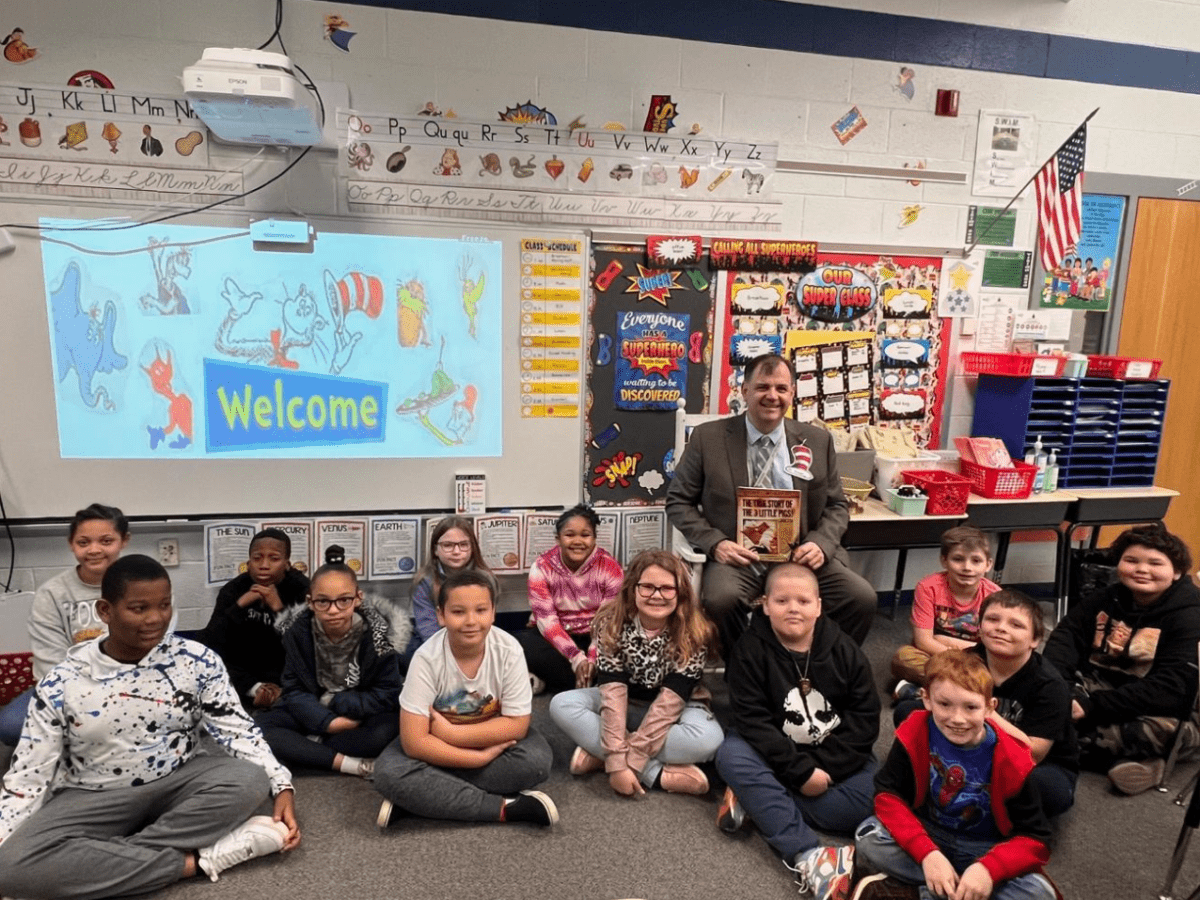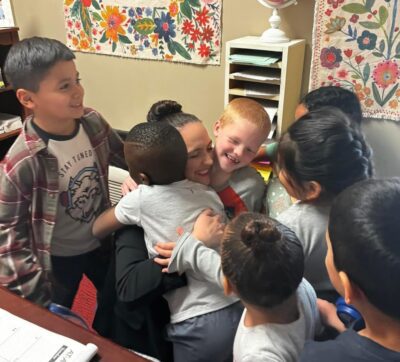
As we approach the end of 2024, we find ourselves reflecting on the incredible successes of our teachers and students across the state. Before the year ends, I wanted to share one final story of impact and reflect on how TFA’s talent sourcing, talent matching, and talent development can lead to limitless opportunities.
Since 1990, Teach For America has brought over 4,000 corps members and leaders to North Carolina. Today, a dynamic network of more than 2,100 alumni continues this work as teachers, principals, nonprofit executives, and leaders across industries. United by an unwavering belief in the potential of all students, they are reimagining education to achieve a future where every child has an equal opportunity to learn, grow, influence, and lead.
Superintendent of Rockingham County Schools, Dr. John “Shawn” Stover is one of those dynamic alumni leaders, and he sat down with us to talk about the importance of teamwork. He dives into how TFA NC shaped the trajectory of both his life and career, and his joy in seeing the excitement that comes from a student once they feel supported and seen.
TFA: Let’s begin with your journey and the experiences that led up to your superintendency.
Superintendent, John “Shawn” Stover: I jokingly say that I came into teaching for all the wrong reasons, but I stayed for all the right reasons. I needed a job as I approached graduation from the University of North Carolina at Chapel Hill, and as an economics major, I planned to get a job at a bank in Rocky Mount. However, in the interview, I was told the bank was no longer hiring due to a recent merger. Walking out of UNC’s career center, I grabbed a Daily Tar Heel campus newspaper and saw an ad from Teach For America that read, “Who will teach for America?” Maybe I will, I thought to myself.
I have always been around kids; I was even a camp counselor at the YMCA’s Camp Kanata in Wake Forest for five years. I chose to apply to Teach For America and was interviewed by Richard Barth, the husband of TFA’s former CEO, Wendy Kopp. I became part of the first Teach For America cohort in 1990 teaching summer school in California before transferring to my placement school in Eastern North Carolina where I taught fourth grade. I was able to help close the achievement gap there and was selected as the 1994 Teacher of the Year in my district.
TFA: Do you believe Teach For America was instrumental in helping to lay the foundation for your path to superintendency?
Superintendent Stover: Absolutely. A big part of TFA’s mission is to create education advocates for students. Our students, particularly those furthest from opportunity, need people who understand the problems and the issues. What kids are going through currently is tough. TFA is a strong community, and now more than ever, we need community. We need community at every level to solve the problems we’re seeing in education.
I believe strongly in Margaret Mead’s quote, “Never doubt that a small group of thoughtful, committed citizens can change the world. Indeed, it is the only thing that ever has.” That mindset and belief is how I lead in schools. One of the few pictures I have on my office desk is of the first class I taught. It reminds me how challenging this work can be and the intentional support teachers need to be successful.

TFA: If not for TFA, do you think you would be doing something entirely different?
Superintendent Stover: Probably, yes. And I would be much unhappier in whatever else I chose to do. I really believe in the idea that if you listen, you’ll be guided to where you need to be. I became a school leader at a young age. I knew I wanted to go into administration and eventually become superintendent. I served as a principal in Roanoke Rapids, Chapel Hill – Carrboro, Alamance-Burlington, and Charlotte Mecklenburg school districts. After CMS, I was ready to move into a different type of position where I could continue to make an impact in the fight for educational excellence.
TFA: Is that when you joined Teach For America’s staff?
Superintendent Stover: Yes, being on staff gave me the opportunity to have business practices in school system settings and engage with more practical solutions that are helpful to the populations we serve. I worked for TFA from 2007-2010 as a Senior Managing Director for the Teacher Support and Development Team. Prior to leaving TFA, I oversaw the largest cohort of corps members by supporting Dallas Fort Worth, Houston, the Rio Grande Valley, Nashville, Memphis, and the Mississippi Delta. I then served as Managing Director for Uplift Education in the Dallas/Fort Worth area before becoming an Instructional Superintendent and Chief of Secondary Schools in Washington, D.C.
By this point, my children had graduated, and I wanted to come back to North Carolina to give back to the communities I grew up around. I applied for the Rockingham County Schools superintendent position in 2022, and I’ve been here since.
TFA: Can you speak to the impact you have had in your role as a superintendent?
Superintendent Stover: We are doing great work to help close the achievement gap. During my time at the Alamance-Burlington school district, we had the second highest performing Title 1 school in the district, achieved the highest recognition in the state as an Honors School of Excellence, and secured a partnership for a traveling dental unit with the goal of increasing student access to care.
In Rockingham County, we are seeing our first increase in local support since 2009. We’re one of sixteen districts in the country that received a $7.5 million dollar Department of Energy grant to help make buildings more energy efficient. In fact, we hired a full-time energy specialist and made it a permanent position. The idea being, if we can spend less on energy, we can dedicate more money to needed education resources. Last year, we received a little over $3 million dollars to help increase local support and we’ve recently collaborated with Cone Health to open a health center in one of our elementary schools. For students who are at risk of dropping out, we offer hands-on career exploration labs.
TFA: What do you attribute to your success?
Superintendent Stover: I own my role. I work hard to create safe environments so my staff can bring me the best version of themselves to do amazing things for kids. I realized as a leader that if you don’t think you have the best team, that’s a problem. Also, I never start anything from scratch. If someone has a better idea, we’ll go with the better idea, and I give that person all the credit. I want my team and staff to walk in their own authority and be a leader.
The Rockingham County School District was an innovative district before I got here, and we remain so. According to outcomes, we’re a Tier 1 district. We must be creative, focused, and collaborative to secure additional grants to help us in this work. Collaboration is the key.
TFA: Speaking of collaboration, can you talk more about your relationship with General Assembly Senate President Pro Tempore Phil Berger, who represents North Carolina’s senate District 26, including Guilford and Rockingham counties?
Superintendent Stover: He is a longtime legislative champion of education and community engagement. When he believes something is great for kids, he can move mountains. He’s a big driver of ensuring we have funding for foundational learning resources, especially for our elementary students. He prioritizes data and focuses on outcomes-based initiatives that work. Evidence-based decisions absolutely help move education forward.
TFA: What makes your district different?
Superintendent Stover: Our strategic plan centers around three pillars that drive everything we do: instructional excellence, operational excellence, and excellent care. We take ideas from the ground up and collaboratively work together on what we call, “the RCS Way.” Goals are closely aligned to our pillars. If we teach standards in an engaging way, and wrap our arms around the students we support, the scores will come.
The best strategy for raising test scores on a district level is to do everything you can to deemphasize the high stakes nature of testing, meaning, we must come up with systems where we understand what a child’s unique education needs are. That’s how you close the achievement gap, by providing students with a sense of safety when they go into the classroom. Learning is a completely volunteer opportunity. No student is learning what they don’t want to learn. You have to invite all students into the learning process.
TFA: Can you elaborate further on the ways students are “invited into the learning process?”
Superintendent Stover: Right now, a TFA alumnus is working with a grant we received for schools in Reidsville and Eden to identify how teachers can work more meaningfully with students, invite them in, and establish strong relationships so that we can not only have great classroom culture, but great learning outcomes for kids. When students truly feel like you have their back, respect and love them, they will go through walls for you. I believe the unit of change starts and ends in the classroom.
TFA: Do you see Teach For America playing a part in partnership roles?
Superintendent Stover: Yes, and we welcome it. TFA helped shape my values and I think it’s important to hire TFA teachers. The biggest hurdle is talent. We don’t have enough people coming into education so we’re thinking creatively about how to change that. We currently have 150 teachers within their first three years of employment. 70% of our administrators are also within the first three years of their roles. We’re doing all we can to prioritize support for our beginner teachers and administrators.
TFA: Teach For America sources, matches, and develops talent in high needs areas. How do you see TFA positively contributing to workforce development?
Superintendent Stover: Absolutely. Everything we do is focused on preparing students for their future and being choice ready. When I became superintendent, only about 28% of our students received CTE (Career and Technical Education) credentials in middle and high school. Last year, we were over 78%. It’s important for us to fundamentally shift how we organize ourselves for education. To address workforce development and support students across graduation lines, we have to think about teaching differently – and TFA can help us do that. TFA has been an innovator by putting the lens on inequities that school systems are facing. The organization can be a leader in how we address the hiring gap, think more deeply about our purpose, and identify how to best set kids up for success.




